MPEDA Tells Indian Shrimp Producers to Tighten  Up Antibiotic Use in Response to EU Crackdown
Up Antibiotic Use in Response to EU Crackdown
India's Marine Products Export Development Authority (MPEDA) told the country's shrimp producers to stop using illegal antibiotics in their operations and asked the industry to begin internal testing of their products for residues. This is part of a response to the EU's decision to inspect at least 50 percent of India's imported shrimp and seafood for illegal antibiotics after a recent wave shipments tested positive for banned substances. MPEDA also plans to meet with EU food inspection authorities to show them how the Indian shrimp industry plans to eliminate the use of antibiotics in shrimp bound for the EU market. “We are going to prepare a detailed statement and give it to the European Authority when they come for discussion. It will contain all the steps we have taken and what we intend to take. There is a meeting scheduled in November in Kochi,” said A Jayathilak, chairman of MPEDA. “Secondly, we are intensifying the testing norms to find out what went wrong and where the problem lies.”
Oregon's Dungeness crab fishery did its part in 2016 to reverse a sharp decline in the state's overall fishery value in 2015, which was reported last week in NOAA's annual Fisheries of the US report. The Oregon Dungeness Crab Commission said the latest federal data was a lagging indicator and that Oregon's Dungeness crab fishery values bounced back in a big way in 2016. Landings were up 70 percent and the fishery posted a record value over $51 million this year. This was a welcome bright spot for the Dungeness crab industry that missed its key holiday sales period this past season since fishing was delayed about three months because of high levels of toxic domoic acid. So far, the industry remains optimistic that fishing will start on time this season on December 1.
In other news, EU and Canadian officials signed the Comprehensive Economic and Trade Agreement (CETA) on Sunday. Canadian Prime Minister Justin Trudeau signed the pact; he was joined by Donald Tusk, the president of the European Council; Prime Minister Robert Fico of Slovakia, which holds the rotating presidency of the body that runs the bloc’s ministerial meetings; and Jean-Claude Juncker, the president of the European Commission. The deal is expected to benefit Canada's seafood industry since it will remove tariffs on many seafood items exported to EU markets.
Meanwhile, Peggy Parker writes of the results from a workshop intended to improve both the sustainability and economic viability of the West Coast groundfish trawl fleet from Alaska to California. More than 75 fishermen and managers participated in the workshop, which was held in July and was hosted by the Environmental Defense Fund, Oregon Trawl Commission, NOAA's Saltonstall-Kennedy Program, Foulweather Trawl, Santa Monica Seafood and Sea Pact.
Finally, Vietnam will soon be able to import seafood tariff-free from China and other markets across Asia now that the ASEAN-China Free Trade Agreement has been ratified. Reports estimate the value of Vietnam's seafood imports with China at around $45 million. Vietnam has had to import more shrimp raw materials from China and other Asian markets since its domestic production in the Mekong Delta was hit hard from prolonged drought.
To Read Full Story Login Below.